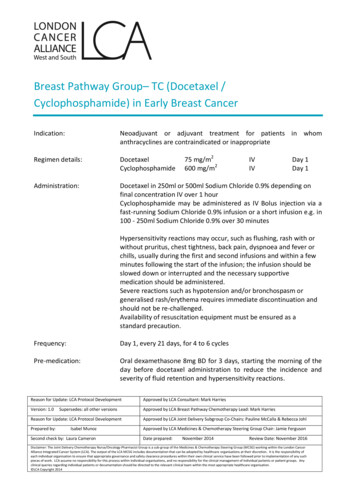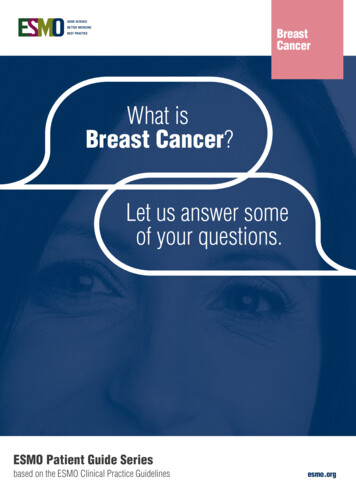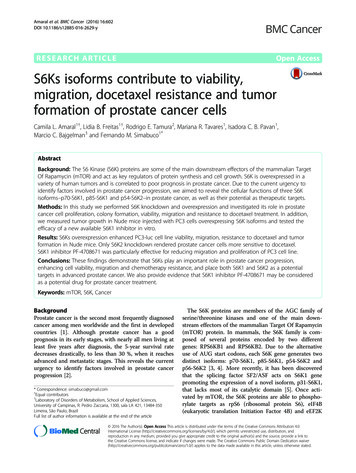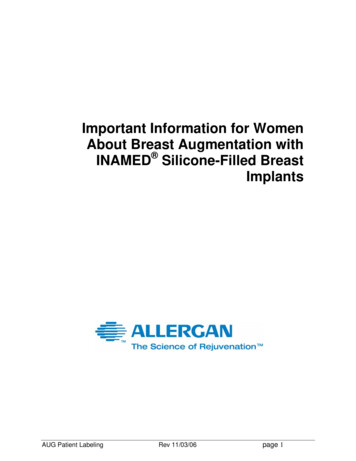
Transcription
Breast Pathway Group– TC (Docetaxel /Cyclophosphamide) in Early Breast CancerIndication:Neoadjuvant or adjuvant treatment for patients in whomanthracyclines are contraindicated or inappropriateRegimen cetaxel in 250ml or 500ml Sodium Chloride 0.9% depending onfinal concentration IV over 1 hourCyclophosphamide may be administered as IV Bolus injection via afast-running Sodium Chloride 0.9% infusion or a short infusion e.g. in100 - 250ml Sodium Chloride 0.9% over 30 minutes75 mg/m2600 mg/m2IVIVDay 1Day 1Hypersensitivity reactions may occur, such as flushing, rash with orwithout pruritus, chest tightness, back pain, dyspnoea and fever orchills, usually during the first and second infusions and within a fewminutes following the start of the infusion; the infusion should beslowed down or interrupted and the necessary supportivemedication should be administered.Severe reactions such as hypotension and/or bronchospasm orgeneralised rash/erythema requires immediate discontinuation andshould not be re-challenged.Availability of resuscitation equipment must be ensured as astandard precaution.Frequency:Day 1, every 21 days, for 4 to 6 cyclesPre-medication:Oral dexamethasone 8mg BD for 3 days, starting the morning of theday before docetaxel administration to reduce the incidence andseverity of fluid retention and hypersensitivity reactions.Reason for Update: LCA Protocol DevelopmentApproved by LCA Consultant: Mark HarriesVersion: 1.0Approved by LCA Breast Pathway Chemotherapy Lead: Mark HarriesSupersedes: all other versionsReason for Update: LCA Protocol DevelopmentApproved by LCA Joint Delivery Subgroup Co-Chairs: Pauline McCalla & Rebecca JohlPrepared by:Approved by LCA Medicines & Chemotherapy Steering Group Chair: Jamie FergusonIsabel MunozSecond check by: Laura CameronDate prepared:November 2014Review Date: November 2016Disclaimer: The Joint Delivery Chemotherapy Nurse/Oncology Pharmacist Group is a sub-group of the Medicines & Chemotherapy Steering Group (MCSG) working within the London CancerAlliance Integrated Cancer System (LCA). The output of the LCA MCSG includes documentation that can be adopted by healthcare organisations at their discretion. It is the responsibility ofeach individual organisation to ensure that appropriate governance and safety clearance procedures within their own clinical service have been followed prior to implementation of any suchpieces of work. LCA assume no responsibility for this process within individual organisations, and no responsibility for the clinical management of individual patients or patient groups. Anyclinical queries regarding individual patients or documentation should be directed to the relevant clinical team within the most appropriate healthcare organisation. LCA Copyright 2014
Breast Pathway Group– TC (Docetaxel / Cyclophosphamide) in Early Breast CancerIf the patient has not taken the oral pre-medication, clinicians mayprescribe dexamethasone IV 20mg, chlorphenamine IV 10mg andranitidine IV 50mg to be administered 1 hour prior to chemotherapy.(note: there is no data available to support the use of IV steroids inthis setting, responsibility remains with the prescribing clinician).Paracetamol / Chlorphenamine / Hydrocortisone can be given foradministration-related reactions such as chills / fever.Anti- emetics:Moderate emetogenicityFollow Local Anti-emetic PolicySupportive medication:GCSF as per local policyMouthcare as per local policyExtravasation:Docetaxel: vesicantCyclophosphamide: non-vesicantDocetaxel should be administered with appropriate precautions toprevent extravasation.If there is any possibility that extravasation has occurred, contact asenior member of the medical team and follow local protocol fordealing with cytotoxic extravasationRegular investigations:Prior to cycle 1FBCLFTsU&EsDay 1 (within 14 days)Day 1 (within 14 days)Day 1 (within 14 days)Prior to Day 1 (all cycles)FBCLFTsU&EsToxicities:Day 1 (within 72 hours)Day 1 (within 72 hours)Day 1 (within 72 hours)Myelosuppression, alopecia, nausea, vomiting, diarrhoea, mucositisasthenia, myalgia/arthralgia, fatigue, fluid retention, peripheralneuropathy, hypersensitivity reactions, cutaneous reactions(reversible), nail disorder, ovarian failure, infertilityReason for Update: LCA Protocol DevelopmentApproved by LCA Consultant: Mark HarriesVersion: 1.0Approved by LCA Breast Pathway Chemotherapy Lead: Mark HarriesSupersedes: all other versionsReason for Update: LCA Protocol DevelopmentApproved by LCA Joint Delivery Subgroup Co-Chairs: Pauline McCalla & Rebecca JohlPrepared by:Approved by LCA Medicines & Chemotherapy Steering Group Chair: Jamie FergusonIsabel MunozSecond check by: Laura CameronDate prepared:November 2014Review Date: November2016Disclaimer: The Joint Delivery Chemotherapy Nurse/Oncology Pharmacist Group is a sub-group of the Medicines & Chemotherapy Steering Group (MCSG) working within the London CancerAlliance Integrated Cancer System (LCA). The output of the LCA MCSG includes documentation that can be adopted by healthcare organisations at their discretion. It is the responsibility ofeach individual organisation to ensure that appropriate governance and safety clearance procedures within their own clinical service have been followed prior to implementation of any suchpieces of work. LCA assume no responsibility for this process within individual organisations, and no responsibility for the clinical management of individual patients or patient groups. Anyclinical queries regarding individual patients or documentation should be directed to the relevant clinical team within the most appropriate healthcare organisation. LCA Copyright 2014
Breast Pathway Group– TC (Docetaxel / Cyclophosphamide) in Early Breast CancerDOSE MODIFICATIONSHaematological ToxicityNeutrophils(x 109/L) 1.0 1.0&orPlatelets(x 109/L) 100 100Dose100% doseDelay for 1 week.Repeat FBC, if recovered to above these levels, resumetreatment at 100% dose.In neoadjuvant/adjuvant treatment, dose reduction and delays can compromise outcome.GCSF should be considered if more than one delay and/or before dose reduction. If in doubt,seek Consultant advice.If during the preceding cycle, the patient has experienced neutrophils 0.5 x 10 9/L or hasfebrile neutropenia diagnosed, GCSF should be considered.If despite GCSF treatment, febrile neutropenia occurs or a dose delay is required - seekConsultant advice and consider dose reduction by 25%If platelets persistently 100 x 109/L on Day 1 despite dose delay - seek Consultant advice andconsider dose reduction by 25%Non-haematological ToxicitiesRenal ImpairmentCrCl (ml/min) 2010 - 20 10Docetaxel Dose100%100%Discuss with consultant, consider adose reductionCyclophosphamide Dose100%75%Discuss with consultant, consider50%Hepatic ImpairmentBilirubinAST / ALTALK PhosDocetaxel DoseCyclophosphamide doseAny& 1.5& 2.5 x ULN100%100%Any& 1.6 - 3.5 x ULN & 2.5 – 6 x ULN75% dose100% ULN& 3.5& 6 x ULNDo not giveConsider dose reduction** Cyclophosphamide is not recommended in patients with a bilirubin 17µmol/L or AST/ALT morethan 2-3 UNL, however, exposure to active metabolites may not be increased, suggesting thatdose reduction may not be needed. Discuss with Consultant.Reason for Update: LCA Protocol DevelopmentApproved by LCA Consultant: Mark HarriesVersion: 1.0Approved by LCA Breast Pathway Chemotherapy Lead: Mark HarriesSupersedes: all other versionsReason for Update: LCA Protocol DevelopmentApproved by LCA Joint Delivery Subgroup Co-Chairs: Pauline McCalla & Rebecca JohlPrepared by:Approved by LCA Medicines & Chemotherapy Steering Group Chair: Jamie FergusonIsabel MunozSecond check by: Laura CameronDate prepared:November 2014Review Date: November2016Disclaimer: The Joint Delivery Chemotherapy Nurse/Oncology Pharmacist Group is a sub-group of the Medicines & Chemotherapy Steering Group (MCSG) working within the London CancerAlliance Integrated Cancer System (LCA). The output of the LCA MCSG includes documentation that can be adopted by healthcare organisations at their discretion. It is the responsibility ofeach individual organisation to ensure that appropriate governance and safety clearance procedures within their own clinical service have been followed prior to implementation of any suchpieces of work. LCA assume no responsibility for this process within individual organisations, and no responsibility for the clinical management of individual patients or patient groups. Anyclinical queries regarding individual patients or documentation should be directed to the relevant clinical team within the most appropriate healthcare organisation. LCA Copyright 2014
Breast Pathway Group– TC (Docetaxel / Cyclophosphamide) in Early Breast CancerDose modifications for other toxicities as appropriateDocetaxelNCI CTCAEGrade123Cutaneous ReactionsDoseErythema without associated symptomsLocalised erythema of the palms of the handsand soles of the feet with oedema followed bydesquamationSevere, generalised eruptions followed bydesquamation100% doseConsider dose reduction to75% dose4Generalised exfoliative, ulcerative or bullousdermatitisDelay until recovery to Grade2, reduce to 75% doseFor 2nd occurrence, discontinuedocetaxelDiscontinue docetaxelpermanentlyNCI CTCAEGrade1Sensory NeuropathyDoseParaesthesia (including tingling), but notinterfering with functionParaesthesia interfering with function, but notinterfering with activities of daily livingParaesthesia interfering with activities of dailyliving100% dose234DisablingLocation of regimendelivery:Comments:CyclophosphamideConsider dose reduction to75% doseDelay until recovery to Grade2, reduce to 75% doseFor 2nd occurrence, discontinuedocetaxelDiscontinue docetaxelpermanentlyOutpatient settingAvailability of resuscitation equipment must be ensured as astandard precaution.Haematuria and haemorrhagic cystitis may rarely occur withcyclophosphamide administration (especially at doses above1000mg). Patients should be monitored during therapy andencouraged to maintain adequate fluid intake whilst on therapy.Reason for Update: LCA Protocol DevelopmentApproved by LCA Consultant: Mark HarriesVersion: 1.0Approved by LCA Breast Pathway Chemotherapy Lead: Mark HarriesSupersedes: all other versionsReason for Update: LCA Protocol DevelopmentApproved by LCA Joint Delivery Subgroup Co-Chairs: Pauline McCalla & Rebecca JohlPrepared by:Approved by LCA Medicines & Chemotherapy Steering Group Chair: Jamie FergusonIsabel MunozSecond check by: Laura CameronDate prepared:November 2014Review Date: November2016Disclaimer: The Joint Delivery Chemotherapy Nurse/Oncology Pharmacist Group is a sub-group of the Medicines & Chemotherapy Steering Group (MCSG) working within the London CancerAlliance Integrated Cancer System (LCA). The output of the LCA MCSG includes documentation that can be adopted by healthcare organisations at their discretion. It is the responsibility ofeach individual organisation to ensure that appropriate governance and safety clearance procedures within their own clinical service have been followed prior to implementation of any suchpieces of work. LCA assume no responsibility for this process within individual organisations, and no responsibility for the clinical management of individual patients or patient groups. Anyclinical queries regarding individual patients or documentation should be directed to the relevant clinical team within the most appropriate healthcare organisation. LCA Copyright 2014
Breast Pathway Group– TC (Docetaxel / Cyclophosphamide) in Early Breast CancerPulmonary Fibrosis and Interstitial Pneumonitis is a rarecomplication of cyclophosphamide therapy and patients should bemonitored for signs and symptoms of pulmonary dysfunction duringtreatment. Cyclophosphamide should be discontinued if fibrosisdevelopsDrug interactions:DocetaxelConcomitant administration of substrates, inducers or inhibitors ofcytochrome P450-3A e.g. ciclosporin, terfenadine, ketoconazole,erythromycin, rifampicin, barbiturates etc, may alter thepharmacokinetics of docetaxelCyclophosphamideAllopurinol: can increase the incidence of serious bone marrowdepressionAmiodarone: increased risk of pulmonary fibrosis ; avoidcombination if possibleGrapefruit juice: decreased or delayed activation ofcyclophosphamide. Avoid grapefruit juice for 48 hours before and onday of cyclophosphamideIndapamide: prolonged leucopenia is possibleItraconazole: might increase Cyclophosphamide side effectse.g.haemorrhagic cystitis, pigmentation of palms, nails and soles etc.Warfarin: anticoagulant effect is increasedReferences:Summary of Product Characteristics. Docetaxel Accord, updated 04/10/2013UCLH- Dosage Adjustment for Cytotoxics in Renal Impairment. January 2009UCLH- Dosage Adjustment for Cytotoxics in Hepatic Impairment. January 2009Jones SW, Savin MA, Holmes FA, et al. Phase III Trial Comparing Doxorubicin PlusCyclophosphamide With Docetaxel Plus Cyclophosphamide As Adjuvant Therapy for OperableBreast Cancer. J Clin Oncol 2009; 27(8): 1177-1183LCA Breast Cancer Clinical Guidelines October 2013Reason for Update: LCA Protocol DevelopmentApproved by LCA Consultant: Mark HarriesVersion: 1.0Approved by LCA Breast Pathway Chemotherapy Lead: Mark HarriesSupersedes: all other versionsReason for Update: LCA Protocol DevelopmentApproved by LCA Joint Delivery Subgroup Co-Chairs: Pauline McCalla & Rebecca JohlPrepared by:Approved by LCA Medicines & Chemotherapy Steering Group Chair: Jamie FergusonIsabel MunozSecond check by: Laura CameronDate prepared:November 2014Review Date: November2016Disclaimer: The Joint Delivery Chemotherapy Nurse/Oncology Pharmacist Group is a sub-group of the Medicines & Chemotherapy Steering Group (MCSG) working within the London CancerAlliance Integrated Cancer System (LCA). The output of the LCA MCSG includes documentation that can be adopted by healthcare organisations at their discretion. It is the responsibility ofeach individual organisation to ensure that appropriate governance and safety clearance procedures within their own clinical service have been followed prior to implementation of any suchpieces of work. LCA assume no responsibility for this process within individual organisations, and no responsibility for the clinical management of individual patients or patient groups. Anyclinical queries regarding individual patients or documentation should be directed to the relevant clinical team within the most appropriate healthcare organisation. LCA Copyright 2014
Regimen details: Docetaxel 75 mg/m2 IV Day 1 Cyclophosphamide 600 mg/m2 IV Day 1 Administration: Docetaxel in 250ml or 500ml Sodium Chloride 0.9% depending on . Breast Pathway Group- TC (Docetaxel / Cyclophosphamide) in Early Breast Cancer Reason for Update: LCA Protocol Development Approved by LCA Consultant: Mark Harries









